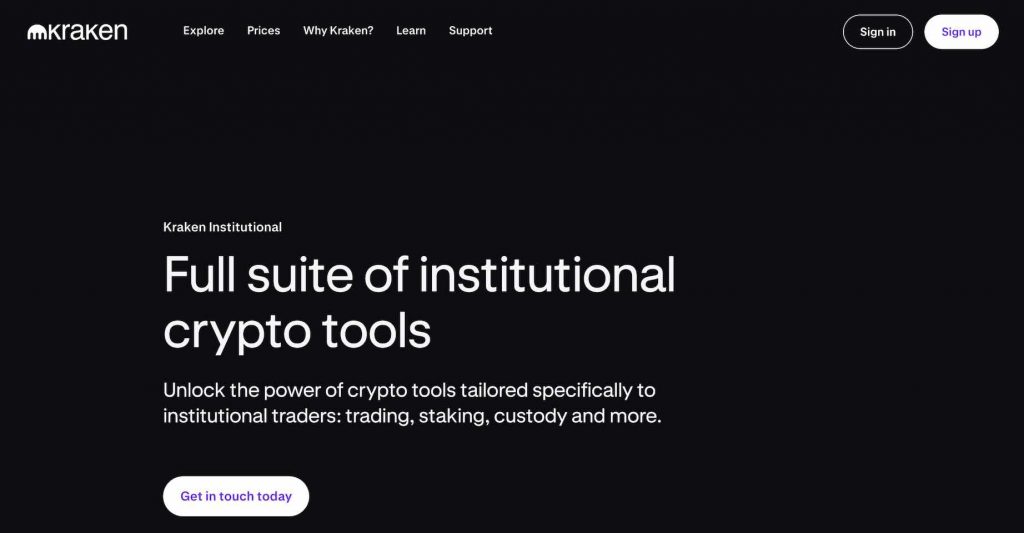With the regulatory developments in the crypto space, exchanges should make sure they remain compliant with the rules. One of the main procedures they use to achieve this goal is Know Your Business or KYB. In this article, we’ll analyze what KYB is and explain how top exchanges carry out this process. So, if you are an institutional investor or any business looking to expand to the crypto market and use exchanges, we will guide you to have a safe onboarding process.
At the beginning of the article, we will thoroughly explain what KYB is and how it generally works. In the following sections, we will analyze the primary elements of KYB and the difference between KYB and KYC. Finally, we will discuss why KYB is so important in crypto and guide you through the KYB process on top exchanges.
What Is KYB? (Know Your Business)
KYB (Know Your Business) in crypto exchanges is a crucial step in the onboarding process. In the KYB process, the exchange verifies the identity of a business entity to make sure that it is who it claims to be. It’s really obvious how crucial it is in a loosely regulated crypto space. This process helps reduce the risk of fraud and money laundering. So, it essentially improves the crypto space.

Meanwhile, identity verification is the first step of the business structure. The exchange reviews the legal structure of the business. This includes its documents, registration, or any license or permit for operating in the financial industry. A background check is also done by the exchange on the business entity. They check out the history of not only the company itself but also its team and owners.
You can really get a sense of how important KYB is. Most top exchanges that offer institutional services go through this process. This is not only good practice but also helps the business survive and avoid regulatory crackdowns in the long run.
Looking to optimize your crypto taxes? Explore our in-depth article on crypto tax-free countries and discover the best tax calculation tools to simplify your reporting.
What Are the Elements of KYB?
We’ve already mentioned some of the initial steps in the Know Your Business process. Here is a quick overview of the primary elements and steps exchanges go through in their onboarding and KYB process:
- Verify Business Structure: The exchange verifies the legal structure of the business. Incorporation, registration, or any relevant document is analyzed in this step.
- Background Check: As already mentioned, the exchange conducts a thorough background check on the business. It monitors the past records of the business’s directors, officers, and beneficial owners. They verify their identities, addresses, and criminal records.
- Source of Funds: The exchange verifies the source of the business’s funds. This is obviously due to compliance with AML frameworks. Exchanges confirm that the funds do not come from illegal activities. So, they aim to prevent dirty funds from flowing into their platform.
- Risk Assessment: The exchange assesses the business’s risk profile. This process is based on factors such as industry, size, and geographic location by convention. This helps the exchange to identify potential high-risk businesses to avoid working with.
- Continuous Monitoring: The KYB process does not end after the onboarding process. In fact, the exchange continuously monitors the business’s activities and updates its records. Any changes to the business’s structure or ownership should be documented and verified.
KYB vs KYC: What Is the Difference?
KYB (Know Your Business) and KYC (Know Your Customer) are both fundamental for crypto exchanges. The main difference between KYB and KYC is that they focus on different entities. KYB is aimed at verifying businesses and ensuring that companies using the exchange are genuine and not involved in illegal activities. It helps exchanges assess the risk associated with business clients. They should make sure that these companies follow regulatory standards. Some important examples are Anti-Money Laundering (AML) and Counter-Terrorist Financing (CTF).

On the contrary, KYC focuses on individual customers. Exchanges demand identification documents and proof of address to confirm their customers’ identities. KYC helps financial institutions verify individual customers and ensure they are compliant. Similar to KYB, KYC is essential for preventing the flow of dirty funds into exchanges. So, the primary difference is the type of entity the exchange verifies.
Why Is KYB so Important for Crypto Exchanges?
KYB (Know Your Business) is very important for crypto exchanges. This is because it helps ensure that partner businesses are legit. Here are some key reasons why KYB is necessary for crypto exchanges:
- Compliance with Regulations: KYB helps crypto exchanges comply with AML and KYC regulations. Failure to implement these processes can result in losing crypto licenses and regulatory crackdowns.
- Risk Management: KYB helps exchanges identify and mitigate potential risks associated with businesses. They verify the source of funds, business structure, and background of the business. So they can make sure they are (and were) not involved in any legal activities.
- Customer Trust: By implementing robust KYB processes, crypto exchanges will commit to customer safety. This builds trust with customers and banking partners. No business or even individual wants to work with an exchange that serves shady companies.
- Efficient Onboarding: AN automated KYB helps exchanges streamline the onboarding process for businesses. It reduces the time and resources required for verification. This even makes the exchange attractive for institutional investors.
- Protection of Assets and Reputation: KYB helps protect a company’s assets and reputation. The exchange reduces the risk of unwantedly taking part in illegal activities such as money laundering.
- Regulatory Monitoring: The rise of cryptocurrency has led to increased regulatory monitoring. KYB helps exchanges stay in line with these regulations. This would increase their longevity dramatically.
An Overview of the KYB Process in Top Exchanges
KYB (Know Your Business) is a crucial process for top crypto exchanges that serve institutional investors. Here are some key points about KYB in these exchanges:
Binance KYB
Binance Know Your Business (KYB) is compulsory for any institution that wants to work with Binance. The exchange identifies and verifies the background and corporate structure of the company. Binance is the largest crypto exchange in the world and has been able to remain this way by being compliant with the regulations. Their KYB process is one of the main contributing factors.

Here are the required steps for any company to complete the Binance KYB process:
To complete the Know Your Business (KYB) process on Binance, you’ll need to follow several detailed steps. Here’s a summary of the process:
- Account Creation: Create an entity account on the Binance platform. You’ll need to provide an entity email and verify it using a code sent to your email. Create a secure password and enable two-factor authentication (2FA).
- Starting the Verification Process: If you already have an unverified Binance account, log in, go to your profile, and click “Verify Now.” Begin the verification by entering your entity’s name, registration number, and other necessary details.
- Basic Information: Fill in the basic information. This includes the entity name, registration number, incorporation date, registered and operating business addresses, and source declarations such as the source of capital, wealth, and funds. Also, provide additional information, such as the purpose of creating an account on Binance and contact details.
- Related Parties: Enter details about related parties. These are company directors, beneficial owners, controllers, and authorized account traders. The main trader should also complete a facial verification process using the Binance app.
- Upload Documents: Upload required corporate documents, which will vary based on your country, legal form, and nature of the business.
- Fiat Enablement (Optional): If you need fiat services, you can enable this during the verification process by providing additional details and documents. This step can be completed later.
- Submission and Review: After completing all sections, submit your application. You will need to agree to the declarations and await the review process. You’ll be notified once the review is complete.

Read our comprehensive guide on Binance KYC.
Bybit
The Bybit KYB process has the same goal as Binance: ensuring safety and compliance. Bybit’s business customers must go through this process to be able to use Bybit’s institutional services. Here’s a detailed breakdown of Bybit KYB based on the exchange’s official guidelines:

- Create a Bybit Account: If you don’t already have a Bybit account, you’ll need to register one. You should provide your email and create a password.
- Start the KYB Process: Log in to your Bybit account and navigate to the profile icon. Click on “Account & Security” and then “Verify Now” under the KYB section.
- Provide Basic Company Information: Enter essential details about your company. The entity name, registration number, country of registration, and type of business are required.
- Upload Required Documents: Prepare and upload the following documents:
- Certificate of Incorporation
- Articles, constitution, or memorandum of association
- Latest register of members and directors
- Information of Ultimate Beneficial Owners (UBOs) owning 25% or more of the company
- Passport/ID and proof of address for all directors and UBOs
- Information of the account operator/trader, if different from the UBO
- An organizational chart showing share distribution
- Verify the Identity of UBOs: Separate verification links will be sent via email to UBOs. They should complete their identity verification on their own.
- Proof of Address: Provide proof of address documents such as utility bills, bank statements, or government-issued residential proofs are needed. These documents should all be dated within the last three months.
- Submission and Review: Once all documents are uploaded, submit the application. Bybit will review the information and documents provided. You’ll receive an email confirmation once your application is approved. Then, you can begin using Bybit’s institutional services.
- Additional Compliance: If necessary, you may need to provide additional information or documents. Bybit may contact you for further verification if needed.

Heard rumors about Bybit in Canada? Find out the latest on whether Bybit has been banned or is still operating in the Canadian market.
Kraken
Like Binance and Bybit, the Kraken KYB process is required for all businesses using the exchange. Kraken requires various documents to open a business account. We will mention these docs below. So, in order to complete the Kraken KYB process, you’ll need to follow these detailed steps:

- Create a Kraken Account: Register for an account on Kraken if you don’t already have one. Ensure your email and password meet the security requirements.
- Begin the Verification: Log in to your Kraken account. Navigate to the “Get Verified” section from your profile settings. Select the preferred verification level.
- Provide Basic Company Information: Enter essential details about your business like the company name, registration number, country of registration, and type of business.
- Upload Required Documents: Prepare and upload necessary documents. These include:
- Certificate of Incorporation
- Articles of Association or equivalent
- A recent register of members and directors
- Information on Ultimate Beneficial Owners (UBOs) who hold 25% or more ownership
- Passport/ID and proof of residence for all directors and UBOs
- An organizational chart showing share distribution
- Verification of UBOs: Separate verification links will be sent to the UBOs via email to complete their identity verification individually.
- Proof of Address: Provide proof of address documents such as utility bills, bank statements, or government-issued residential proofs. All of them should be issued within the last three months.
- Submission and Review: After completing all sections and providing accurate information, submit your application. Kraken will review the information and documents. They’ll notify you via email once the verification process is complete.
Finestel: Best B2B Crypto Solution Provider
If you own a crypto business and operate as an asset manager or even have a community, Finestel’s services might boost your efficiency drastically. First and foremost, we offer a top-notch copy trading bot. It allows you to replicate your trades in your followers’ accounts instantly. This is an innovative way for money managers to manage their clients’ portfolios.
For more serious traders with a considerable AUM, we offer white-label copy trading software. This is where our cutting-edge copy trading software meets maximum customization. You will be able to launch your own copy trading platform branded with your logo. There are also various CRM and marketing tools, portfolio tracking features, and billing automation services to help you manage your operations efficiently. With Finestel, you can start your own crypto hedge fund in no time.
Conclusion
The Know Your Business (KYB) process is an essential compliance measure for crypto exchanges. They need to make sure businesses using their services are legitimate and not involved in illegal activities. By verifying the identity, structure, and background of business entities, exchanges can mitigate risks. They will be able to follow regulatory requirements and build trust with their customers.
For institutional investors and businesses, understanding and completing the KYB process is crucial. By following the steps we outlined for each of the top exchanges, you can ensure that you’ll meet all necessary requirements. Overall, as the crypto industry continues to evolve, KYB will remain vital for both exchanges and their clients.






Leave a Reply